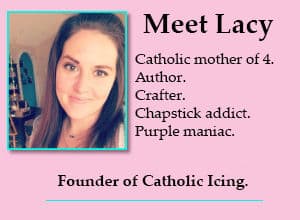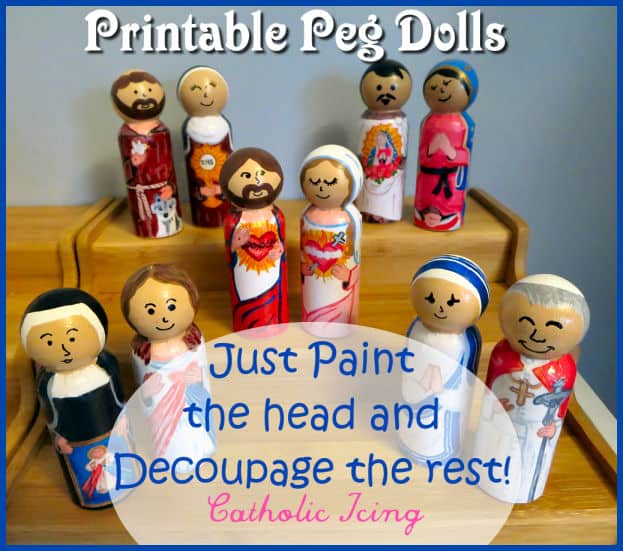The Day of the Dead, or as it’s known in Spanish, Dia de los Muertos, happens at the beginning of November each year. There is a lot of confusion around how to celebrate this occasion as a Catholic, and whether it’s for all Catholics or just those with Mexican heritage. Today we are going to take a look at the traditions, terms, heritage, and meaning behind Dia de los Muertos, and how to celebrate as a Catholic. You can find all of my resources on living the liturgical year in November here. Let’s dive in!
The Day of the Dead happens each year on November 1 and 2 which do coincide with the feast days of All Saints and All Souls Days on the Catholic liturgical calendar. The celebrations can also often begin on October 31, or All Hallow’s Eve.
Is It Ok For Non Mexican Catholics To Celebrate The Day Of The Dead?
Absolutely, as it is a Catholic feast day and the dead are remembered all over the world! There are many traditions from many countries where the dead are honored and remembered with altars and flowers- some of these traditions stem from Catholicism and some of them don’t, but as humans, it’s very normal to remember the dead.
Let’s look at a break down of what the Catholic church teaches for the month of November.
The entire month of November is dedicated to faithfully departed souls. All Saints’ Day is specifically for those in heaven (canonized and not), and All Souls’ Day is for the souls in Purgatory. In the Catholic faith, we absolutely pray for the dead and the repose of their souls. In fact, we have an “after dinner” prayer that is prayed year round for this purpose.
November brings extra attention to this with the month’s special dedication to faithfully departed souls. Also, the first 8 days of November in particular there is an octave of praying for souls. You can read here about praying for plenary indulgence during these days.
Which traditions are Catholic and which traditions are Mexican?
The following traditions are normal for all Catholics on All Saints’ Day:
✔️ Going to Mass (as this is a Holy Day of Obligation, meaning attending Mass is required)
✔️ Praying for the dead
✔️ Remembering the dead specifically on November 1 and 2
✔️ Praying before photographs of deceased loved ones
✔️ Lighting candles in conjunction with praying for the dead
✔️ Having home altars (I have many home altar resources for Catholic families here)
✔️ Offering flowers on a home altar
✔️ Visiting the graves of loved ones and leaving flowers
You can also specifically see how our family sets up a November home altar to remember the dead here. This version doesn’t have any symbols or traditions that are specific to Mexican culture.
These traditions are specific to Mexican Catholic culture:
✔️ Praying specifically for deceased children on November 1 (Dide los Inocentes) and deceased adults on November 2 (Dide los Muertos)
✔️ Using colorful decorated skulls to symbolize mortality and the link between life and death
Post continues after this brief information about the Catholic Icing Monthly Membership
Monthly Liturgical Membership
✔️ Decorating graves and holding all night vigils in the grave yard
✔️ Having an ofrenda, which is a specific multi tiered altar for this day (You can watch a video about ofrendas here)
✔️ Sugar skulls as treats to symbolize the sweetness of life
✔️ Colorful traditional Mexican paper banners (papel picado)
✔️ Decorating the altars with marigold flowers and bread
Is having a Day of the Dead Altar Cultural Appropriation?
I suppose this would really depend on how you are doing it and what your intention is, but for Catholics remembering the dead on this day and having an altar to do so, that is not cultural appropriation. If you’re setting up “Halloween decorations” that look like the Day of the Dead celebrations, give no credit to the heritage of the traditions, and have no meaning to you and no link to your own heritage… you might want to rethink that.
It is very normal for Catholics to set up altars for various feast days and celebrations year round. In fact, it’s a long and beautiful tradition to keep a Catholic home altar going in your home all the time. The fact that Mexican Catholics also do this doesn’t make it wrong for non Mexican Catholics to do this.
Is it ok for all Catholics to incorporate some Mexican Specific traditions, even if they’re not Mexican?
I reached out to many Mexican friends to ask if this was offensive to them and everyone I talked to said it wasn’t.
I would say if you’re going to include Mexican aspects and traditions to your celebrations, you will want to give credit to the culture where it came from. I recommend this for all cultural celebrations that families might participate in.
A great way to do this would be to read to your little ones about the heritage of this day. Here is a great list of kid’s books that highlight the actual Mexican traditions of Dia de los Muertos:
You can watch a video reading of A Gift For Abulita here, which is a charming children’s book about this special celebration.
Ways to honor Mexican heritage for Dia de los Muertos
- Utilize some of the terms in the Spanish language (I provided a list below the next video)
- Go to a Mexican restaurant during this week. You are likely to see an authentic ofrenda along with traditional Mexican decorations used for these celebrations.
- Talk to your Mexican friends or those in your community about their celebrations and what it means to them.
- Read some books from the list provided above to learn about their authentic traditions for these days.
- Support Mexican artists and small businesses! If you’re going to decorate for Dia de los Muertos, why not support an actual Mexican and get something authentic?
- Watch a video! I love to watch videos with my kids to hear the language, music, and true images of cultural celebrations from around the world! Here is a little 2 minute vide that would be great to show kids some authentic images of these Dia de los Muertos celebrations in action.
Some Spanish terms used for the Day of the Dead:
- Dia de los Muertos- Day of the Dead
- Dide los Inocentes- Day of the innocent (for remembering children, November 1)
- Dide los Muertos- Day for remembering deceased adults (November 2)
- Ofrenda- a special altar that has multiple tiers. These hold things like marigold flowers, photographs and personal items of deceased loved ones, colorful skulls and skeletons, sugar candy skulls, colorful paper banners, bread, food enjoyed by your deceased loved ones, and religious items.
- Papel picado- traditional Mexican paper banners
- Calaveras- skulls, most commonly referring to the decorative sugar skulls used in celebrating these days
Is The Day Of The Dead in line with Catholic Church teachings?
There are some aspects of these celebrations that can be traced back to Mesoamerican cultures. In Aztec tradition, the month of August was dedicated to the celebrating the dead. Many aspects of Catholicism find their roots in former traditions, such as the Christmas tree, so that’s not special to the Day of the Dead.
There is a belief among some that the dead come back to life on this day, and that belief would definitely not align with Church teachings. The idea that the dead need or want earthly possessions from us such as food or trinkets is also not part of Catholic teachings.
More Day Of The Dead Resources For Catholic Families:
You can check out my other ideas for celebrating Catholic feast days in November here.
















This is an excellent article. Thank you!
Día de todos los santos – Nov 1 (of course here we remember the Little ones gone too soon)
Día de los muertos -Nov 2
Día de los inocentes (Dec 28)
I am mexican, it is not offensive to celebrate if you are not Mexican!! Thanks so much for the info
Yes I’m with Elena.
All saints (día De los Santos) November 1
Holy innocents (día de los inocentes) December 28
Just so there is not confusion.
I am also Mexican
As a Hispanic Catholic, I’m going to respectfully disagree that the Day of the Dead–a holiday instituted by Aztecs–is Catholic. It’s a blend of pagan beliefs with our faith. E.g., they have a a Santa Muerte (Saint Death). And they worship other deities. Also, we Catholics do not believe the dead come back to join us on that day. I mean, we have the Church Suffering in Purgatory and the Church Triumphant in Heaven that we honor on Nov. 1 and 2nd. Please do not conflate this with our beautiful Catholic traditions.
NONE of my relatives celebrate with sugar skulls or any of this other nonsense. And I have a lot of relatives. Lol.